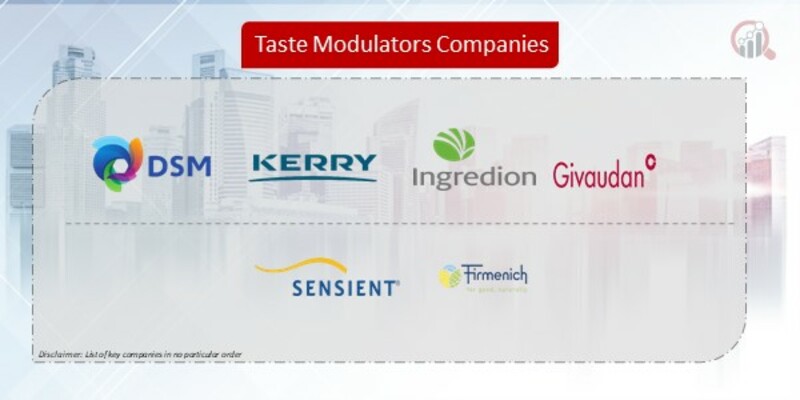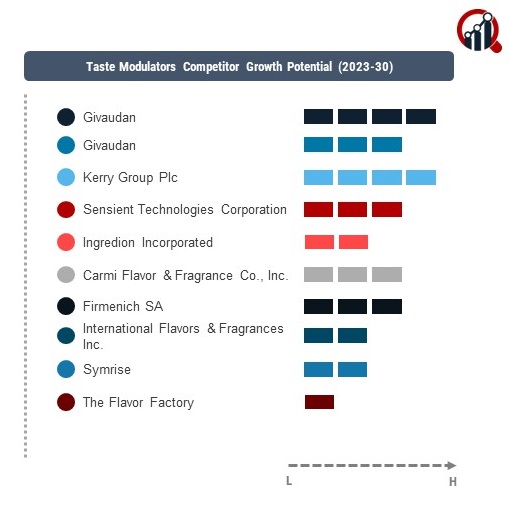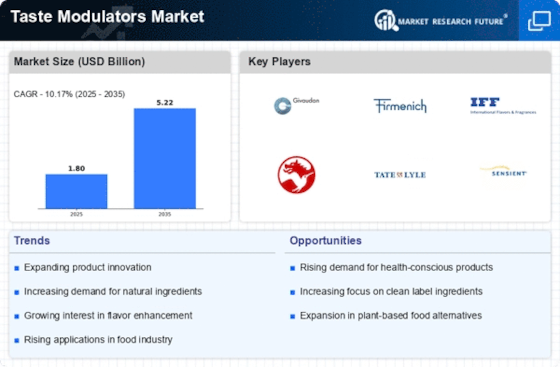Top Industry Leaders in the Taste Modulators Market

The competitive landscape of the taste modulators market is dynamic, with key players employing diverse strategies to gain a competitive edge in this rapidly evolving sector. Prominent companies in the taste modulators market include
- Givaudan (Switzerland)
- Koninklijke DSM N.V. (Netherlands)
- Kerry Group plc (Ireland)
- Sensient Technologies Corporation (US)
- Ingredion Incorporated (US)
- Carmi Flavor & Fragrance Co. Inc. (US)
- Firmenich SA (Switzerland)
- International Flavors & Fragrances Inc. (US)
- Symrise (Germany)
- The Flavor Factory (US) among others
Strategies Adopted:
Strategies adopted by these key players vary but commonly revolve around innovation and partnerships. One prevalent approach is investing in research and development to create novel taste modulators that meet consumer preferences for healthier and flavorful food and beverage options. Kerry Group, for example, consistently invests in cutting-edge R&D initiatives to develop taste modulators that address emerging consumer trends such as clean label and reduced sugar content.
Strategic collaborations and partnerships are also common in this market. Companies like Firmenich SA engage in partnerships with food and beverage manufacturers to incorporate taste modulators into their products. Such collaborations allow for a wider market reach and the integration of taste modulators into a variety of food and beverage applications.
Market Share Analysis Factors:
Market share analysis in the taste modulators sector is influenced by various factors. The ability to provide a diverse range of taste modulation solutions is a key factor for market share. Companies that offer solutions catering to different taste profiles, such as sweet, savory, and bitter taste modulators, have a competitive advantage. Symrise AG, for instance, has a comprehensive portfolio of taste modulation solutions, enabling them to cater to a broad spectrum of consumer preferences.
Furthermore, the regulatory landscape and compliance with safety and quality standards play a pivotal role in determining market share. Companies investing in rigorous quality control measures, like Sensient Technologies Corporation, build trust among consumers and food manufacturers, which contributes to a solid market position.
New & Emerging Companies:
The entry of new and emerging companies into the taste modulators market adds vitality to the competitive landscape. These companies often focus on niche markets or specific taste modulator applications, bringing innovative solutions and challenging established players. The emergence of smaller players fosters innovation and contributes to the overall growth and dynamism of the taste modulators market.
Industry news and current investment trends provide insights into the market's evolving dynamics. Companies are increasingly investing in sustainable practices, aligning with the growing consumer demand for eco-friendly and ethically sourced ingredients. Ingredion Incorporated, for instance, has been investing in sustainable sourcing of raw materials for taste modulators, reflecting a broader trend toward responsible and transparent supply chains.
Competitive Scenario:
The overall competitive scenario in the taste modulators market is influenced by global trends, consumer preferences, and technological advancements. Companies must adapt to changes in consumer behavior, such as the increasing demand for natural and plant-based taste modulators, to maintain a competitive position. The market's responsiveness to emerging health trends, such as the demand for low-calorie and low-sugar options, shapes the strategies adopted by key players.
Recent Development
A notable development in the taste modulators market is the increasing focus on personalized nutrition. Companies are exploring ways to tailor taste modulators to individual preferences and dietary needs. This development aligns with the broader trend of customization and personalization in the food and beverage industry, indicating a shift towards more targeted and consumer-centric taste modulation solutions.











